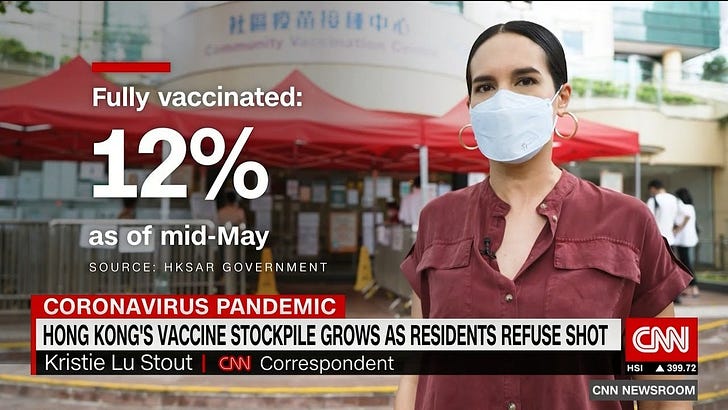HK's vaccine hesitancy, Beijing asks couples to reproduce and the risk of ransomware attacks
31 May - 6 June 2021
Hello June! 👋
Deep Dive is back after a two week hiatus. Thanks for reading! Remember you can follow the Instagram account for additional content - just click the button below.
A PANDEMIC PARADOX
This edition of the newsletter is coming to you from sunny Dubai. I’ll be based in the UAE temporarily before returning to London next month.
It felt strange saying goodbye to Hong Kong after living there for four years - and, of course, the Covid pandemic added further layers of frustration and sadness to the proceedings. In many ways, HK was an excellent place to ride out the storm - low risk of infection; no full lockdown; households were allowed to mix; cafes, retail outlets and hairdressers stayed open, and so on.
But the trade off for domestic freedom was - and still is - extremely strict border controls. This can be challenging in a compact city like HK where every flight is essentially an international one, and where foreigners as well as locals have family members living abroad.
In March 2020, HK enforced mandatory 14-day home quarantine - with GPS tracking wristbands - for returning residents and citizens (tourists have since been barred from entering). In November, the rule changed to 14 days in a hotel room. Then by Christmas this morphed into 21 days.
More recently, some of the quarantine durations were reduced to 7-14 days in a hotel depending on the flight origin and passenger’s vaccine doses. But the latter is a highly contentious issue in HK. Although the city’s authorities have enough free BioNTech and Sinovac injections for those aged 16+, the vaccine rate remains sluggish. To date, only 14% of those eligible have received both jabs.
A raft of rewards, including a lottery to win a flat and complimentary plane tickets, appear to be falling on deaf ears. A senior government minister said Hongkongers weren’t “active and enthusiastic” about getting vaccinated, which meant the next batch of BioNTech shots would be delayed to avoid any wastage.
This CNN report explains how mistrust and a wait-and-see attitude have marred the city’s inoculation drive, and could prevent travel regulations from being lifted.
PLEASE PROCREATE, SAYS BEIJING
Although it already manages the world’s biggest population (1.41 billion people to be precise), China’s government wants the country’s married couples to have more babies.
This line of thinking seems counter-intuitive - and certainly ignores Malthusian theory - but Beijing is studying the numbers very differently.
China’s 2020 census revealed that the population grew at the slowest pace in the last decade since the 1950s. The data also showed a fertility rate of 1.3 children per woman, missing a previous target of around 1.8.
Another stat to consider: In 2020, just 12 million babies were born in the country, the lowest since 1961.
These figures are sounding alarm bells in the capital. China’s chiefs are especially worried about the long-term impact of a plateauing, or even shrinking, population. The economy relies on a vast pool of young, working adults to maintain its global powerhouse status. Plus, a rapidly ageing society is expensive to care for and support.
However, when Beijing announced a three-child policy on Monday, the public’s response was muted, if not apathetic. In fact, the introduction of a national two-child policy in 2016 did little to persuade couples to increase their family sizes.


There are various reasons for this: most Chinese millennials are accustomed to only-child culture; the burden of rising living costs; widespread urbanisation and modernisation; and few incentives for women in the labour force, e.g. limited maternity leave.
So despite the CCP’s concerns of a demographic crisis, it’s still “one and done” for the majority of Chinese couples. Yet this trend is not unusual across East Asia: South Korea continues to have the world’s lowest birth rate, while Japan is home to the largest proportion of elderly people.
CYBERSECURITY ALERTS
What do Fujifilm, meatpacker JBS, Colonial Pipeline, insurance giant AXA and the Irish health services have in common? They’re all fresh victims of ransomware attacks.
To recap: Ransomware is a type of malware (harmful software) that infects vulnerable computers and scrambles files. Users are then asked to pay a ransom to get access to the decrypted data.
The latest wave of cybersecurity breaches has disrupted gas deliveries, food supply chains, ferry ticketing services, medical appointments etc. In the end, Colonial Pipeline forked out nearly US$4.5 million in cryptocurrency to restart its operations as quickly as possible.
Unfortunately, the frequency of ransomware attacks is increasing. One key driver is the switch between real and virtual offices, which can lead to IT infrastructure weaknesses. Another factor is the crypto boom - hackers don’t need to rely on banks for transfers.
But top law enforcement agencies and government officials are now telling companies not to pay up. Washington, in particular, is warning bosses to be extra vigilant.
“We can't do it alone…Business leaders have a responsibility to strengthen their cyber defenses to protect the American public and our economy," said White House press secretary Jen Psaki.
With the majority of ransomware assaults believed to emanate from Russia-based organisations, it’s expected that Joe Biden will discuss the matter with Vladimir Putin when the two meet in Geneva on 16 June.
Have a great week ahead! Stay curious, Sara x




Amazing like always… we hope to see each other again somewhere in the world!!! xx